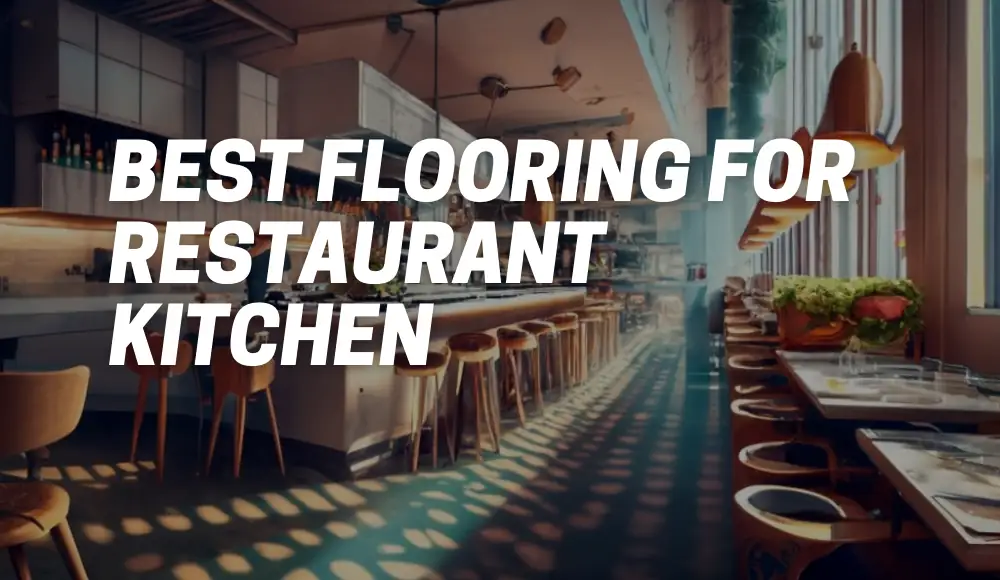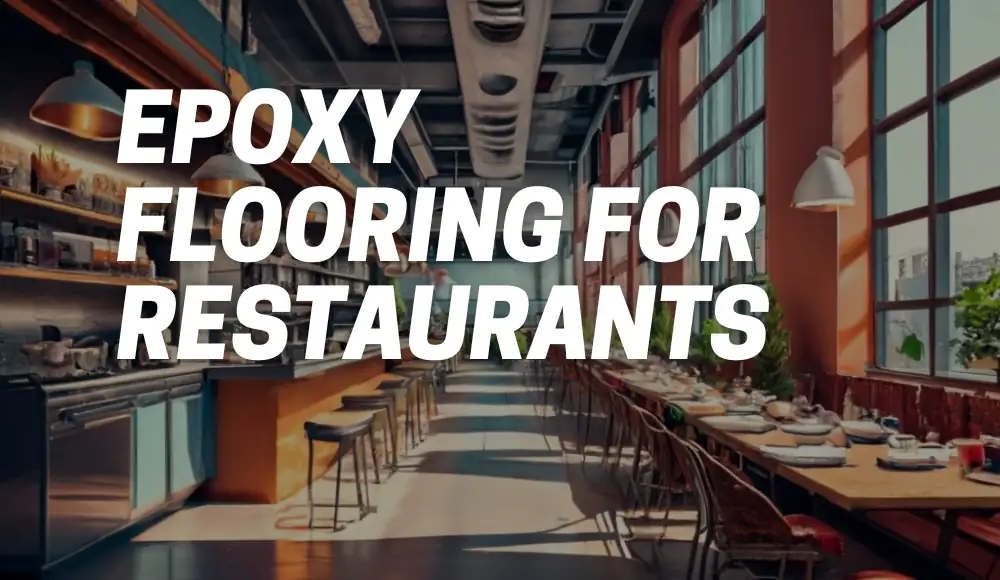Last updated on October 28th, 2023 at 01:04 pm
When you step into a restaurant, you expect a delicious meal, impeccable service, and a charming ambiance. But behind the scenes in the kitchen, there’s a different kind of performance happening – one that requires the right stage. That’s where non-slip flooring for restaurants comes into play. Let’s explore what makes the best flooring for a restaurant kitchen and how to strike the perfect balance between safety and style.
What is the Best Flooring for a Restaurant Kitchen?
The best flooring for a restaurant kitchen is a critical decision. It’s the foundation that ensures safety, functionality, and aesthetics. So, what should you consider?
Factors to Consider When Choosing Restaurant Kitchen Flooring
- Durability: The kitchen floor takes a beating with constant foot traffic, dropped dishes, and spills. It must withstand heavy use without showing signs of wear and tear.
- Safety: Slip and fall accidents are a significant concern in a restaurant kitchen. The flooring should provide a high level of traction to prevent mishaps.
- Ease of Maintenance: With tight schedules and high demand, restaurant kitchens need flooring that’s easy to clean and maintain. Efficiency is key.
- Cost: Budget constraints are common, so it’s crucial to find flooring that balances quality and cost-effectiveness.
Slip-Resistant Flooring Options
Preventing slip and fall accidents should be a top priority. Various flooring materials can help, including:
- Rubber Flooring: Known for its exceptional slip resistance and durability, rubber flooring is a top choice for commercial kitchens.
- Epoxy Flooring: Epoxy creates a seamless and slip-resistant surface, making it a practical option for busy kitchens.
- Vinyl Flooring: Vinyl can mimic the look of wood or tile while offering slip-resistant properties. It’s also cost-effective.
- Commercial Kitchen Flooring Tiles: Specialty tiles designed for commercial kitchens often come with slip-resistant features.
—
Resisting Food Stains and Spills
Kitchens are hotbeds for food and liquid spills. Flooring materials that resist stains and spills are invaluable. Look for options like epoxy, which creates a sealed surface that repels stains.
Balancing Aesthetics and Functionality
Restaurants aim to create a specific atmosphere, even in the kitchen. Balance aesthetics with functionality by choosing flooring materials that align with your overall decor. For a modern look, consider epoxy or sleek vinyl options.
Eco-Friendly Flooring Options
If your restaurant prioritizes sustainability, you’ll be pleased to know there are eco-friendly flooring materials available. Cork and bamboo are sustainable choices that can withstand the rigors of a kitchen.
What Flooring Is Best For Commercial Kitchen Reddit Advice
Here is a table summarizing the main points related to the best flooring for a commercial kitchen based on the user comments:
| Main Points |
|---|
| Most kitchens typically have tiles. |
| Suggested using carpet. |
| Mentioned epoxy flooring with easy cleaning. |
| Mentioned epoxy flooring with baseboards for easy cleaning. |
| Mentioned floors like epoxy need refinishing every few years. |
| Suggested using terrazzo for longevity. |
| Mentioned wood or very slippery cement. |
| Mentioned non-tile anti-slippery floors. |
| Recommended concrete with epoxy as the best. |
| Prefers traditional tile flooring for kitchens. |
These user comments provide a range of suggestions and experiences related to commercial kitchen flooring options.
Cost Comparison
Let’s talk numbers. The cost of restaurant kitchen flooring can vary significantly based on the material you choose. Here’s a rough estimate:
| Flooring Material | Cost (per square foot) |
|---|---|
| Rubber Flooring | $5 – $12 |
| Epoxy Flooring | $2 – $8 |
| Vinyl Flooring | $2 – $7 |
| Commercial Kitchen Tiles | $4 – $10 |
| Cork Flooring | $3 – $8 |
| Bamboo Flooring | $5 – $10 |
Remember that installation costs may add to the overall expense.
Maintenance Requirements
Different types of flooring materials have distinct maintenance needs. For instance:
- Rubber Flooring: Requires regular cleaning and occasional sealing.
- Epoxy Flooring: Needs periodic resealing and spot cleaning for stains.
- Vinyl Flooring: Requires simple routine maintenance like sweeping and mopping.
- Commercial Kitchen Tiles: Routine grout cleaning and occasional tile replacement may be necessary.
Understanding these requirements can prolong the lifespan of your flooring.
Pros and Cons of Common Restaurant Kitchen Flooring Materials
Let’s dive deeper into the pros and cons of some common restaurant kitchen flooring materials:
Ceramic Tile
Pros:
- Resistant to stains
- Durable and long-lasting
- A wide range of designs and styles
Cons:
- Grout lines can be challenging to clean
- Can be hard and less comfortable for standing
Vinyl Flooring
Pros:
- Affordable
- Versatile in design
- Good stain resistance
Cons:
- May not be as durable as other options
- Can get damaged by sharp objects
Epoxy Flooring
Pros:
- Extremely durable
- Seamless and easy to clean
- Highly stain-resistant
Cons:
- Requires professional installation
- May require occasional resealing
Hardwood Flooring
Pros:
- Warm and natural aesthetic
- Durable with proper care
- Can be refinished
Cons:
- Prone to water damage
- Expensive
Choosing the right material depends on your specific needs and priorities.
Finding Reputable Suppliers and Installation Professionals
Now that you have a better understanding of what restaurant kitchen flooring you need, the next step is to source quality materials and reliable installers. Here are a few recommendations:
- Home Depot Pro: They offer a variety of commercial flooring options and installation services.
- Lowe’s ProServices: Another reputable source for restaurant flooring materials and installation.
- Local Flooring Companies: Check your local area for flooring specialists who cater to commercial projects.
By working with professionals, you can ensure that your restaurant kitchen flooring is installed correctly and efficiently.
In conclusion, choosing the best flooring for a restaurant kitchen is a decision that impacts both safety and style. It’s about balancing functionality, aesthetics, and cost. With the right choice, your kitchen will not only be a hub of culinary excellence but also a safe and attractive workspace. So, pick the perfect floor, and let your culinary creativity shine.
For more information and expert advice, you can refer to authoritative sources such as The National Floor Safety Institute.



